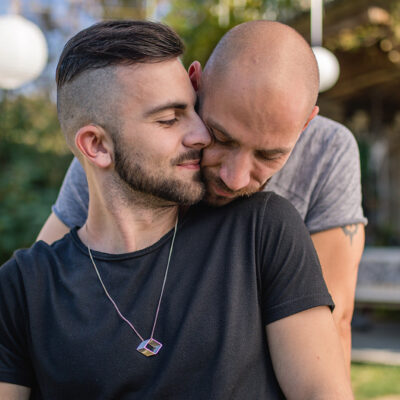People living with HIV who have durably suppressed their viral load to an undetectable viral load for at least six months, and take antiviral therapy (ART) medications as prescribed, do not transmit HIV to sex partners.
The essence of this revolutionary fact is oftentimes captured by the slogan, “U=U” which stands for “undetectable equals untransmittable.”
The science behind U=U spans many years and clinical trials involving thousands of people living with HIV. With tens of thousands of instances of condomless sex documented between partners in serodiscordant (different status) couples, zero HIV transmissions have occurred when the partner living with HIV was undetectable. The U=U message is backed by large health organizations including the National Institutes of Health and the Centers for Disease Control.
The U=U Campaign, initiated by Prevention Access Campaign, promotes and advocates for the undetectable equals untransmittable message in order to decrease HIV stigma and combat the message that people living with HIV pose a “risk.”
Undetectable FAQ
Being undetectable means there are so few copies of the virus in your body that they can’t be
measured or detected by standard viral load tests. Being undetectable with a viral load less than 200 copies/mL for at least six months means you won’t transmit HIV to other people during sex.
Being undetectable also means that the virus is less able to attack your immune system cells which means you will be less likely to get sick if you come into contact with germs, viruses or other infections.
No. Being undetectable does not mean that the virus is gone from your body or that you are cured. If you stop taking your HIV medications, the levels of HIV in your body will increase. It’s important to continue keeping your HIV medications.
Some people have told us that they’re surprised that they test positive for HIV even if they’re undetectable. This makes sense if you think about it: An HIV antibody test will still be reactive if you’re undetectable because your body still has antibodies for HIV. (Antibodies are the cells of your immune system that fight infections.) Other HIV tests that detect viral RNA are able to detect the presence of virus at levels lower than what we typically define as “undetectable.”
So, when you’re undetectable, you will still test positive for HIV.
Most people living with HIV can get to be undetectable by taking their HIV medications every day for a period of time (usually one to six months) as prescribed by their health care provider. Most people can stay undetectable by continuing to take their HIV medications as prescribed by their health care provider. The provider who is managing your health and HIV can tell you more about what you can personally do to get and stay undetectable.
After a generation of HIV stigma, it’s not a surprise that some people have a hard time accepting U=U. Here’s how “treatment as prevention” works:
HIV medications prevent HIV from making copies of itself, or “replicating”. When treatment is effective, it lowers the amount of virus in the body (e.g. your viral load goes down). When you keep taking your medication, your viral load can get so low that it can’t be detected by viral load tests. When you get to undetectable, the amount of virus is so low in your body that you won’t transmit HIV to other people. Read about all the ways to prevent HIV.
When I was diagnosed with HIV in 2003, I felt like I was a walking infection. I was terrified about passing HIV on to someone that I love. I didn’t start treatment because taking a pill every day would remind me that I was infectious, every day. After I started treatment in 2012, when my health started to deteriorate, I learned from my doctor that because I was undetectable, I couldn’t transmit HIV. I couldn’t pass it on. I was elated.Bruce Richman Founder of U=U and Prevention Access Campaign
Join the Movement
Prevention Access Campaign’s Undetectable equals Untransmittable (U=U) is a growing global community of HIV advocates, activists, researchers, and over 800 community partners from nearly 100 countries are uniting to disseminate the revolutionary fact that people living with HIV on effective treatments do not sexually transmit HIV. Join the movement by visiting Prevention Access Campaign online.
Resources About Living with HIV

Lost health insurance? Here are resources to know about
There are resources in San Francisco and beyond that can help–whether you’re looking for PrEP coverage, HIV treatment, basic medical care, trans care, or other types of care.

Lo que hay que saber sobre los cambios importantes en los seguros en 2026
Información imprescindible para personas que viven con VIH, personas que toman PrEP y/o personas inmigrantes sobre los cambios en la cobertura de seguros y programas que pueden ofrecer asistencia.

How young is too young to plan your estate when you’re Queer?
With LGBTQ rights under threat, it’s never too early to make legal arrangements–especially if your family may disagree with your wishes.

Do you ask about Instagram mutuals when dating?
I do. Here’s where it gets me–and how I move on from jealousy and insecurity.

The Revolution Requires Rest
As a Black, queer man living with HIV, leading an organization fighting for our community, exhaustion feels inevitable. But it is unsustainable--exhaustion is not a strategy, and burnout is not a badge.

“Isaac’s Song” speaks to every Black Queer son
This book allowed me a chance to reflect on all of the ways I tried to express the masculinity that Black fathers often expect of their sons, and how I eventually found freedom in my own identity.

Stepping into the brilliance of being a bottom
I wasn't always confident about being a bottom. During my first sexual encounters, I was paralyzed by fear – not just by the vulnerability of the act itself, but of the label.

I survived a politically fraught holiday season. Did you?
I've come to accept that even among well-meaning family members, learning isn't always a straight line, and that there's a fine line between education and emotional warfare.





